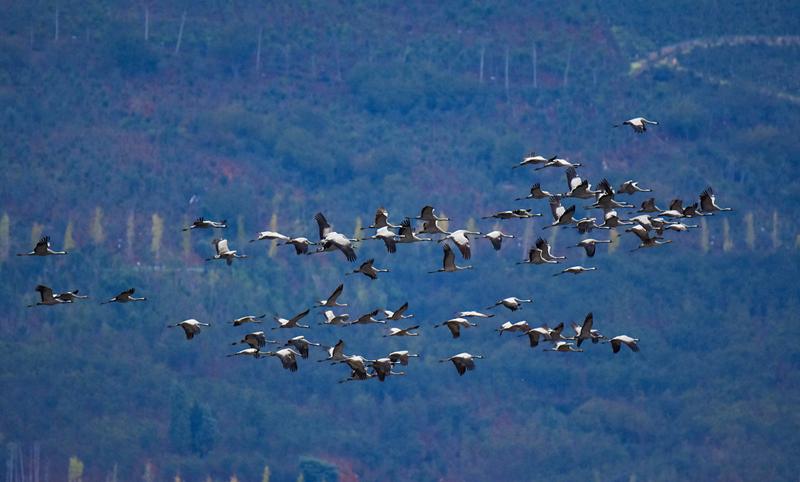Kunming, 5 Nov (Xinhua) -- Autumn is getting thicker and stronger, and migratory birds are moving south. Recently, dozens of rare birds such as the Oriental Plover, the Spot-breasted Sandpiper and the Brown-tailed Eagle have arrived at the Qinghuahai National Wetland Park in Baoshan, Yunnan.
Since October 26 this year, the staff of the Park Management Center has continuously monitored four black storks, a wild animal under national key protection. "Only 1 black stork was detected last year." Lin Lei, director of the Baoshan Qinghuahai National Wetland Park Management Center, said, "After the wetland was restored, the migratory birds gradually increased. ”

Migratory birds fly to Qinghuahai National Wetland Park. Photo courtesy of the interviewee (Photo by Wang Jinfang)
Qinghua Sea has a long history, and in ancient times it was an ocean. Later, due to the surrounding lake for farming, flood control and other reasons, the Qinghuahai wetland gradually degraded and disappeared, and the scene of "lush grass and trees, hundreds of birds flying" no longer existed.
In recent years, Baoshan City has put forward the development strategy of urban ecology and implemented the Qinghuahai Ecological Wetland Restoration Project. Lin Lei believes that wetlands are an indispensable and important part of cities, and wetland parks establish and strengthen the relationship between cities and wetlands. "Qinghuahai has become a green space shared by the people."
Although the weather is getting colder, the Qinghuahai National Wetland Park is still full of life. Some migratory birds sometimes skim the sky and sometimes gently blow the water, and many citizens take their children to walk and play in the park, a harmonious scene.
"I live nearby and often come to the park. The air and scenery here are good, which makes me feel very pleasing to the eye. Ms. Zhang, a citizen, said that walking in the park has become her favorite leisure method. In recent years, she recalls, more and more birds have been seen in the park. "Some birds are not afraid of people, and they rest close to the shore."
A view of Qinghuahai National Wetland Park. (Photo by Xinhua news agency reporter Meng Jia)
With the gradual restoration of the wetland ecosystem and the continuous improvement of the ecological environment, the wetland resources have been effectively protected and restored, attracting more than 20,000 migratory birds, including the critically endangered bird Blue-headed Diving Duck, to the Qinghua Sea for wintering.
Lin Lei said that birds are the "ecological test strip" of the urban environment and are often used as important indicator groups for biodiversity monitoring. "The number of bird populations and the richness of the species can intuitively reflect the changes in the ecological environment."
At present, the species of birds in the Qinghua Sea have increased from 172 species in 2016 to 270 species, including 3 species of national level I key protected birds, 25 species of class II key protected birds, and 2 species of critically endangered species, 2 endangered species, 2 endangered species and 9 near-threatened species listed in the IUCN Red List of Endangered Species.
"While carrying out bird monitoring, we should also increase the protection of birds and habitats throughout the city." Lin Lei said that it is necessary to protect the mountains and rivers like protecting the eyes, and tell the ecological story of beautiful China.